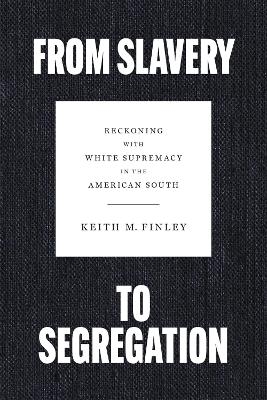
From Slavery to Segregation
Reckoning with White Supremacy in the American South
Seiten
2024
Louisiana State University Press (Verlag)
978-0-8071-8133-1 (ISBN)
Louisiana State University Press (Verlag)
978-0-8071-8133-1 (ISBN)
Explores the key features shaping southern politics during the 19th and 20th centuries as explained in the South's defense of its racial systems. It treats slavery and segregation as part of the same whole rather than as discrete institutions rooted in different periods. Finley underscores the larger American struggle with racial injustice.
Keith M. Finley's From Slavery to Segregation explores the key features shaping southern politics during the nineteenth and twentieth centuries as explained in the South's defense of its racial systems. It treats slavery and segregation as part of the same whole rather than as discrete institutions rooted in different periods. In the process, the book uncovers the deep historical origins of the region's states' rights philosophy and the unfortunate persistence of a culture dominated by calls for white supremacy. While highlighting the broad overview of southern racial and political thought, Finley underscores the larger American struggle with racial injustice, which, although most pronounced in the South, afflicted the entire nation.
The South's defense of chattel slavery became a natural model for the region's defense of segregation during the Jim Crow era. Through a comparative analysis of the rhetoric employed in the justification of both racial institutions, Finley reveals elements of continuity and change in the region's identity. Ultimately, he shows how the history of the twentieth-century South is irreparably linked to the century before it. For instance, one cannot understand the ferocity of resistance to the Supreme Court's 1954 Brown v. Board decision without being aware of how and why the South emerged as it did after the Civil War.
The Old South and the New South shared a similar constellation of ideas that informed arguments advancing their respective race-based social orders, which took the form of a commonality of perception regarding race, a sense of being assailed by outsiders, and a series of appeals to the highest secular authority in the pantheon of regional and American beliefs the Constitution. Discontinuity, however, marked the long-term strategies of both the prewar and postwar South. Although segregationists sought to preserve the racial status quo as did their forebears, they ultimately relented when confronted with federal power and grudgingly shifted toward a narrative that less often foregrounded race when championing states' rights.
Keith M. Finley's From Slavery to Segregation explores the key features shaping southern politics during the nineteenth and twentieth centuries as explained in the South's defense of its racial systems. It treats slavery and segregation as part of the same whole rather than as discrete institutions rooted in different periods. In the process, the book uncovers the deep historical origins of the region's states' rights philosophy and the unfortunate persistence of a culture dominated by calls for white supremacy. While highlighting the broad overview of southern racial and political thought, Finley underscores the larger American struggle with racial injustice, which, although most pronounced in the South, afflicted the entire nation.
The South's defense of chattel slavery became a natural model for the region's defense of segregation during the Jim Crow era. Through a comparative analysis of the rhetoric employed in the justification of both racial institutions, Finley reveals elements of continuity and change in the region's identity. Ultimately, he shows how the history of the twentieth-century South is irreparably linked to the century before it. For instance, one cannot understand the ferocity of resistance to the Supreme Court's 1954 Brown v. Board decision without being aware of how and why the South emerged as it did after the Civil War.
The Old South and the New South shared a similar constellation of ideas that informed arguments advancing their respective race-based social orders, which took the form of a commonality of perception regarding race, a sense of being assailed by outsiders, and a series of appeals to the highest secular authority in the pantheon of regional and American beliefs the Constitution. Discontinuity, however, marked the long-term strategies of both the prewar and postwar South. Although segregationists sought to preserve the racial status quo as did their forebears, they ultimately relented when confronted with federal power and grudgingly shifted toward a narrative that less often foregrounded race when championing states' rights.
Keith M. Finley is associate professor of history and assistant director of the Center for Southeast Louisiana Studies at Southeastern Louisiana University. He is the author of Delaying the Dream: Southern Senators and the Fight against Civil Rights, 1938-1965.
| Erscheinungsdatum | 06.09.2024 |
|---|---|
| Verlagsort | Baton Rouge |
| Sprache | englisch |
| Maße | 152 x 229 mm |
| Themenwelt | Geisteswissenschaften ► Geschichte ► Allgemeine Geschichte |
| Geisteswissenschaften ► Geschichte ► Regional- / Ländergeschichte | |
| Sozialwissenschaften ► Politik / Verwaltung | |
| Sozialwissenschaften ► Soziologie ► Makrosoziologie | |
| ISBN-10 | 0-8071-8133-1 / 0807181331 |
| ISBN-13 | 978-0-8071-8133-1 / 9780807181331 |
| Zustand | Neuware |
| Haben Sie eine Frage zum Produkt? |
Mehr entdecken
aus dem Bereich
aus dem Bereich
eine Familiengeschichte der Menschheit
Buch | Hardcover (2023)
Klett-Cotta (Verlag)
49,00 €
Eine wahre Geschichte von Schiffbruch, Mord und Meuterei
Buch | Hardcover (2024)
C.Bertelsmann (Verlag)
25,00 €


